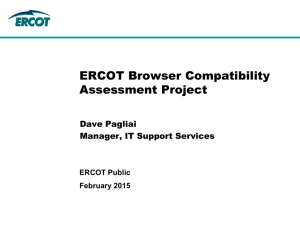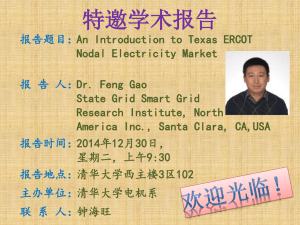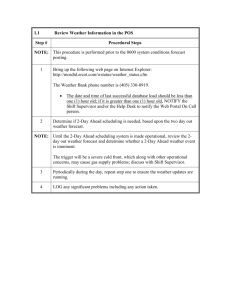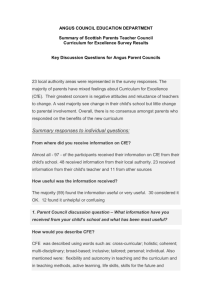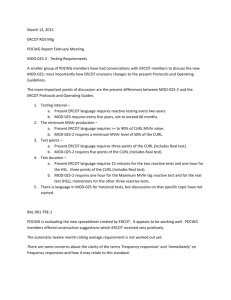Presentation of Sharyland Utilities 150 MW Back-to
advertisement
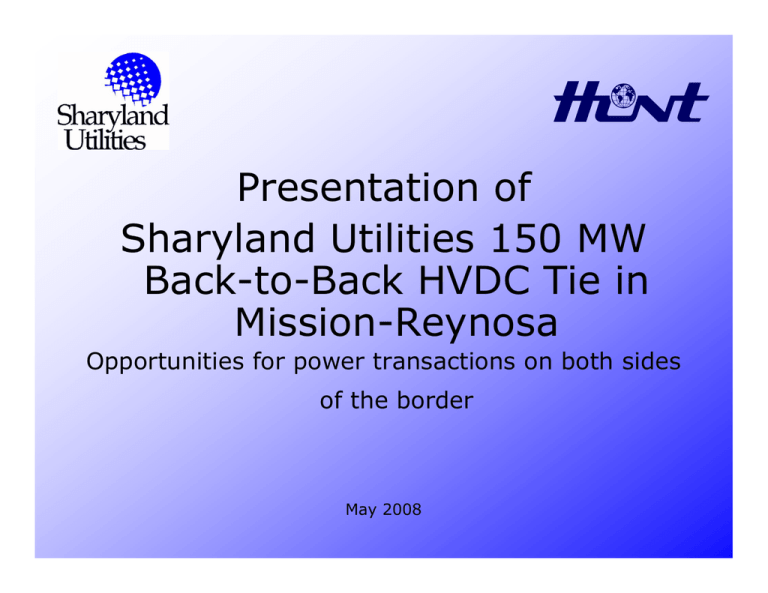
ASDFG Presentation of Sharyland Utilities 150 MW Back-to-Back HVDC Tie in Mission-Reynosa Opportunities for power transactions on both sides of the border May 2008 Current Interconnections between Mexico-US Miguel, Ca – Tijuana 230 KV 800 MW Imperial Valley, Ca – La Rosita 230 KV El Paso, Tx. – Cd. Juárez (2) 115 KV 200 MW total Current Interconnections between Mexico-Texas Grid Operators Texas ERCOT México CFE - CRE Eagle Pass– Piedras Negras 230 KV HVDC 36 MW TEXAS Laredo – Nuevo Laredo 230 KV VFT 100 MW Falcon (Zapata)– Guerrero 138 KV 80 MW Mission – Reynosa 138 KV HVDC 150 MW Brownsville – Matamoros (2) 138 KV 120 MW ERCOT = Electric Reliability Council of Texas CFE = Comisión Federal de Electricidad CRE = Comisión Reguladora de Energía Sharyland DC Tie • 150 MW High Voltage Direct Current (HVDC) Interconnection • Links Electric Reliability Council of Texas (ERCOT) with the Mexican national grid operated by the Comisión Federal de Electricidad (CFE) • Back to back technology allows two way flow of electricity, while acting as firewall to isolate disturbances • Black start capability provides start up capacity to either side in case of system collapse • First of its kind to support commercial transactions between Texas and Mexico • Commissioned in October 2007 – entire project went from concept to operational within five years. Energy Flows (Northeast Mexico Customers) Resource Texas Coah. Electricity Sales Dispatch and wheeling (virtual) Cust Energy Service Cust N.L. México Tamps. Cust Gulf of Mexico Current status of the Sharyland DC Tie • Sharyland DC Tie is operational since October 2007. It has already been used for at least one emergency situation along the border • 7 US-based entities obtained export permits from DOE that included Sharyland DC Tie as a possible cross-over point (refer to Appendix for names) • FERC has waived its jurisdiction over to ERCOT for this service • CRE and CFE are modifying the Interconnection Agreement template to accommodate the use of the DC Ties for commercial purposes. It is expected to have a final document ready by Summer 2008 • ERCOT & CFE are finalizing modifications to operating procedures and guidelines. It is expected that this is finished on or before Summer 2008 FERC = Federal Energy Regulatory Commission ERCOT = Electric Reliability Council of Texas DOE = Department of Energy CFE = Comisión Federal de Electricidad CRE = Comisión Reguladora de Energía How is it expected that the bilateral electricity trade will occur? Venta de Electricidad Electricity Sellers Transacciones privadas y bilaterales Recursos Resources Balancea la oferta y demanda de energía Balanced schedules of load and resources Private bilateral energy Transactions Enlace Entidades para despacho Scheduling Entities Compra de Electricidad Electricity Buyers Servicios de Energía Load Serving Entities Clientes Retail Customers Major requisites to use the DC Tie 1) Customer : 9 Be an established legal entity in Mexico 9 Or, via an established energy broker 3) CFE : 9 Sign back-up contract with 9 Sign interconnection contract 9 Install smart meter with remote comm. ports *** 2) CRE : 9 Import permit • Use format CREDGE-005* 9 File for wheeling analysis ** • Total demand (MW) • Estimated annual consumption (MWh) * Published in Mexico Diario Oficial 3/17/2006 ** Refer to annex for some cost examples *** Customer has to pay all charges involved Steps for setting up to import electricity for ERCOT • Find a energy procurement or wholesaler in Texas ° Understand and negotiate Power Purchase Agreement • Exporter is responsible to file for DOE export permit ° Be it the end user that is filing it’s own permit, ° or use a wholesaler or broker with one (refer to the appendix) • File for CRE import permit ° Site and load specific; must be done by Mexican entity ° Understand wheeling and interconnection fees • Sign interconnection agreement with CFE ° CRE and CFE will determine feasibility of best route, wheeling costs, terms of wheeling, back up conditions. ° Function of specific Texas-based agreement with supplier • ERCOT and CFE are the operators ° All communications occur between QSE and ERCOT, and ERCOT and CFE Aggregator or Broker US Purchasing and Selling Entity 2 1 Qualifying Scheduling Entity QSE 4 Bilateral Contract Sales Order Commission How the process works? 1 5 ERCOT DC Tie 7 CENACE/CFE 3 Electricity Importer Mexico Interconnection Agreement Mexico Consulting Fee 6 Summary of scheduling process across the Sharyland DC Tie (refer to figure in previous slide) 1. 2. 3. 4. 5. 6. 7. PSE generates a bilateral transaction within ERCOT or CFE PSE creates and submits an Electronic Tag (E-Tag) for approval. CFE validates that there is indeed a contract in place with PSE, validates information, and checks available capacity on Sharyland DC Tie PSE arranges a market schedule in ERCOT to be sent to the PSE’s QSE QSE submits an obligation schedule to ERCOT ERCOT approves the E-Tag if it complies with its scheduling requirements and if there is enough capacity across the Sharyland DC-Tie In the Day-Ahead, ERCOT matches the obligation schedule with the Non-ERCOT (or Mexico) E-Tags Source: ERCOT DC-Tie Operations. ERCOT/CFE could change at any time and without prior notice the operating procedures, so this slide and the following are depicted for ilustration of how a typical commercial operation would occur. Please refer to ERCOT and CFE website for most current information on the use of DC Ties. How is transmission reserved across the Sharyland DC Tie? • ERCOT requires: ° Purchasing-Selling Entity (PSE) that wants to schedule power into or out of ERCOT must be registered as a Qualified Scheduling Entity (QSE)1 or have an agreement with a QSE ° The QSE can submit a bilateral schedule to use the Sharyland DC Tie declaring the export as a QSE obligation as per ERCOT Protocols and Operating Guides • CFE requires: ° A PSE wanting to schedule power into Mexico must have an interconnection agreement with CFE, and must have a valid import permit with the CRE 1 http://www.ercot.com/services/rq/qse/index.html What happens in emergencies? • ERCOT follows NERC specifications when: ° There is loss of generation or load ° Reduction of Available Transfer Capacity ° Mitigation of a system contingency • ERCOT will use Last In, First Out (LIFO) for priorizing curtailment • IF CFE initiates curtailment: ° They will contact Sharyland DC tie operator ° They will also use LIFO to program curtailment schedule • ERCOT will not approve overbooking across the Sharyland DC Tie Advantages of using the Sharyland DC Tie • The Sharyland DC Tie is an open access facility • It will enhance the power flows amongst the two regions, and will enable markets to take advantages of market asymmetries and regional price signals • It is expected that power flows will be North to South during Mexico’s peak hours and South to North during ERCOT’s peak hours, particularly if margin reserves continue to be challenged by demand growth • Because it is the first time this type of facility is available, there are tangible arbitrage opportunities that will be available for first movers. Eventually, though, the markets will become efficient The State of ERCOT • Markets are deregulated • Markets prefer trading with structured blocks, example: ° 7x24 or 5x4, etc ° Unique load shapes or blocks are harder to price • Typical price structure (US$/Mwh): ° ° ° ° Energy: $75 + Ancillary: $4 + Line Losses: $2 = Total energy at Point of Delivery (POD) $81/Mwh (not including wheeling, which typically varies around $1.5-2.5 Mwh) Pricing structure in ERCOT • Fixed Price ° Locks in ancillary, capacity & fuel components • Heat Rate ° Locks in ancillary & capacity, floats fuel costs • MCPE ° Locks in ancillary, floats capacity and fuel costs • Others ° Would be based on unique load shapes Case Study North East Mexico Case Study Facts: • • • • High end industrial customer with a CFE HS-L rate Located within Monterrey, Mexico area 38.5 MW of load Peak hour consumption estimated at 27 GWh Assumptions: • Load factor of 0.9 • Used March 2008 CFE Northeast region energy costs (published in CFE website) • Estimated wheeling costs $ 1.7 USD / mwh * • 100% of total demand is considered as back up demand * As per CRE wheeling simulator All-In peak hour price comparison $0.50 $0.45 $0.40 $0.35 $0.30 ERCOT $0.25 CFE $0.20 $0.15 $0.10 $0.05 $0.00 J F M A M J J A S O N D 14.4% Reduction of Total Cost 45.4% of Peak Energy Cost Reduction Conclusions • DC Tie service is an efficient, reliable and accepted way to reduce peak hour energy costs in the Northeast region (further wheeling analysis would have to be used to show how much savings accrue further south) • Because it is the first time this type of facility is available, there are tangible arbitrage opportunities that will be available for first movers. Eventually, the markets will become efficient • Texas energy supply is deregulated and there are a myriad of supply and structuring options that a customer has to choose from ASDFG Contact Information: Enrique J. Marroquin Hunt Transmission Services, L.L.C. 1900 North Akard Street Dallas, Texas 75201 214-978-8947 emarroquin@hunttransmission.com www.hunttransmission.com Annex: Filing costs with CRE • a) b) c) d) • (updated Feb. 08) Analysis and filing costs with CRE for import permits are a function of the load size: MXN$ USD$ (approx) Up to 10 MW $69,620 $6,000 Between 10 and 50 MW $90,853 $8,000 Between 50 and 200 MW $134,343 $12,000 Over 200 MW $568,229 $50,000 An annual fee of $7,337 ($US 650) will be assessed every year to each permit holder as a means to cover CRE costs related to managing the permits DOE Export Permits • The following entities are shown to have a current DOE permit to export electricity to Mexico. Please refer to DOE website for changes to the names listed herein. ° ° ° ° ° ° ° AEP Energy Partners CSW Power Marketing Tex Mex Energy Coral Power Edison Mission Marketing & Trading, Inc (EMMT) BP Energy Company Duke Energy Trading and Marketing, LLC Annex: Screen shot of CRE wheeling cost simulator
